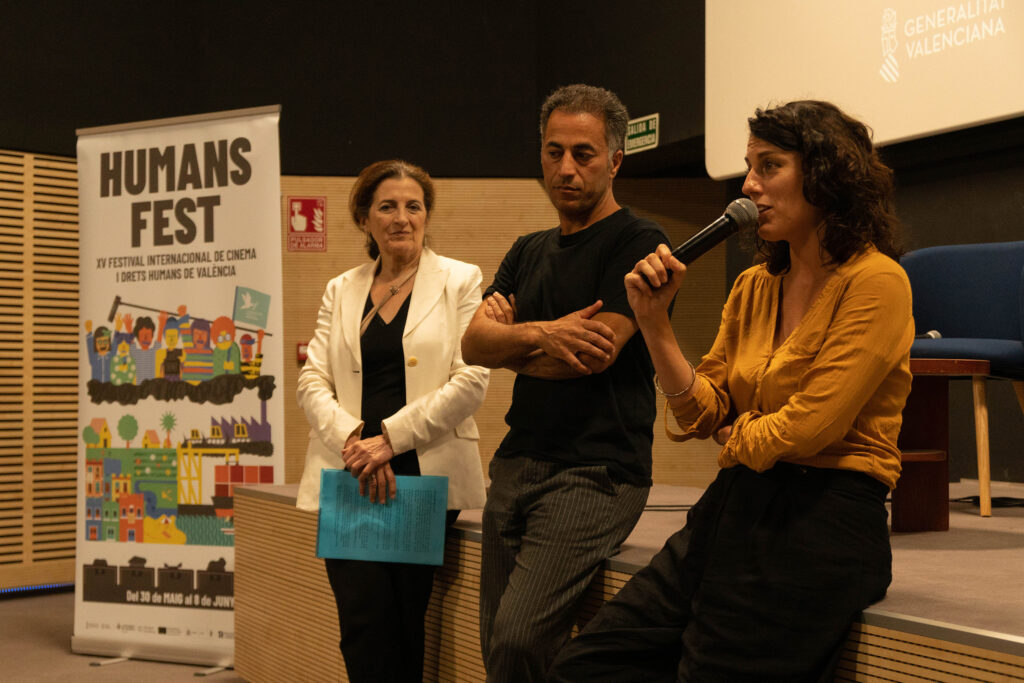This series of talks, one of the main novelties of the Humans Fest, will also address sustainable filming, fast fashion or international jurisprudence to defend the environment
The official Curt i Barrejat section offers from this Monday the first titles in competition in the SGAE Center Cultural Room
The right to culture of people deprived of liberty and the challenges of disseminating climate change will be the first topics that the Debates Humans, one of the main novelties of the Valencia International Film and Human Rights Festival, Humans Fest, organized by Fundación por la Justicia, whose 15th edition runs until June 8.
The Rector Peset Residence Hall will host until Friday the Debates Humans, an activity that will offer a total of seven talks, some with projections included, in which there will be experts to address climate change and the defense of the territory from multiple perspectives.
The first of these meetings begins this Tuesday at 4:00 p.m. with When the body dances, the mind forgets, title of the documentary produced by La Cosecha Comunicación about a dance group led by a professional dancer in the Picassent penitentiary center; initiative that for the male inmates has become a family and a space of freedom.
The second meeting, Climate talks, will begin at 6:30 p.m. and in it the environmental disseminators Andreu Escrivà and Magda Bandera will talk to find out the answers to citizens' daily questions about climate change and the challenges that dissemination projects have, in a talk moderated by the journalist Pilar Almenar and organized in collaboration with the magazine Climate.
The Debates Humans They will continue on Thursday the 6th at 6:30 p.m. with the talk Fast fashion and inequalities about the fast fashion industry. The screening of the documentary Dirty clothes (Félix Zurita de Higes, 2021), which analyzes the exhausting working conditions of the women who make textiles in Central America and its parallels with those not so different from those of the Valencian Country, where more than 700 textile companies have closed, will give walk to a subsequent discussion with ISCOD-UGT activists and shopkeepers from Elche.
On Friday the 7th the last three meetings will take place. First, Sustainable cinema (limited capacity), will address from 11:00 a.m. the environmental impact of film productions and how to develop more sustainable filming. Sixto García, eco-manager and member of the Sustainability Commission of the Valencian Audiovisual Academy (AVAV); Jaime Fons, representative of the Spanish Network for Sustainable Development, and producer Deborah Micheletti will talk about how to adapt the audiovisual sector to reduce the environmental impact of productions.
Next, the meeting Cameras and (climatic) action! Starting at 5:00 p.m., it will offer the screening of the participatory short films resulting from the documentary workshop organized by Humans Fest together with the Fundación por la Justicia with activists against climate change. Touristification, identity and defense of the territory and the dystopian future of the city of Valencia are the respective plots of the short films No Places (Elena Krause, Conxa Solano, Margaret Flaws, Roberta Callicó and Gabriel Lozano), Move Horizontally (Marina Reig Vega, Andrés Ortiz, Sofía Val Corvera and Patricia Azpelicueta) and New Val 2075 (Jaume Ferrando, Ruth Davia, Lydia Melia and José Octavio Toledo-Alcalde).
Finally, the meeting Ecosystems on trial will analyze international jurisprudence to defend the environment and human rights with the help of Antonio Vercher Noguera, Prosecutor of the Supreme Court Chamber, Coordinator of Environment and Urban Planning and lawyer of the European Court of Justice, in a talk presented by Izabel Rigo Portocarrero, deputy director of the Public Law Area and academic coordinator of the Master's Degree in Environmental Law at the International University of La Rioja (UNIR).
The Official Short Film Section begins: Curt i Barrejat
Organized by Fundación por la Justicia since 2009, the Valencia International Film and Human Rights Festival, Humans Fest, offers in its 15th edition more than 40 fiction films and documentaries to show citizens how climate change is fought from different perspectives. parts of the world, as well as multiple initiatives in defense of the territory from the local to the international level.
The official competitive section Curt i Barrejat, which brings together 21 of these titles, will also start this Monday, June 3 at Sala SGAE Center Cultural, from 5:00 p.m. to 8:00 p.m. There will be three sessions of Valencian, Spanish and international short films, fiction and documentary genres, all of them unpublished in the city of Valencia. These works compete for the awards for best documentary short, best fiction short, best Valencian short film and best Valencian short film script, awarded by the Association of Valencian Audiovisual Writers, EDAV.
The first session offers the titles this Monday Agur Artzai (Julien Zubiete, Spain), Durian Trees (Shi Chin Cheun, Malaysia), Where Children Don't Dream (Stefano Sbrulli, Peru, Italy), Tahlequah The Whale: A Dance Of Grief (Daniel Kreizberg, Lithuania, USA), The Silence Of The Song (Alan Luna, Spain), Casting (Víctor Devesa, Spain) and First Coin (Anna Juesas and Sonia Sánchez, Spain).
The second program will offer the short films on Tuesday, June 4 Don Benjamin (Iván Zahínos, Spain), Puyuelo (Sara Sarrablo Asensio, Spain), Wan (Víctor Monigote, Spain), Trenc D'alba (Ana Llargués, Spain), Lion Dreams (Jordi López Navarro, Spain), Local Risk (Manuel Vitali, Italy), and 180 Graus (Dani Reina, Spain).
Finally, on Wednesday, in a session with audio description, the titles will be projected The Mirror of the Valley (Alejandra Gómez Pinilla, Peru), Passing Teruel (Manuel Omonte, Spain), The Apartment (Claudia García de Mateos, Spain), Glass, Paper, Organic (Almudena Vázquez, Spain), Alone No (Doriam Alonso, Spain), Trolley (Luis E. Pérez Cuevas, Spain) and 13 (Màriam Zelaia, Spain).
Humans Fest is part of the international Human Rights Film Network. Its 15th edition is celebrated thanks to the collaboration of the Second Vice Presidency and Department of Social Services, Equality and Housing, Diputació de València, Ajuntament de València, Institut Valencià de Cultura, Caixa Popular and Teika. For its part, the Valencian regional radio and television station, À Punt, is the official media of the festival.

